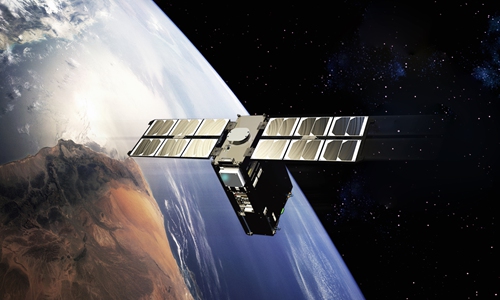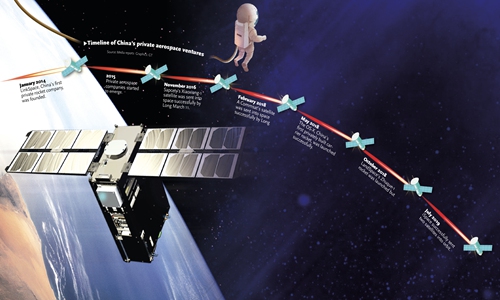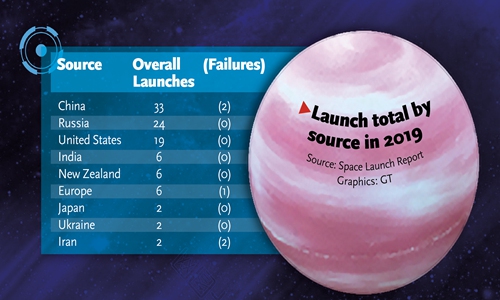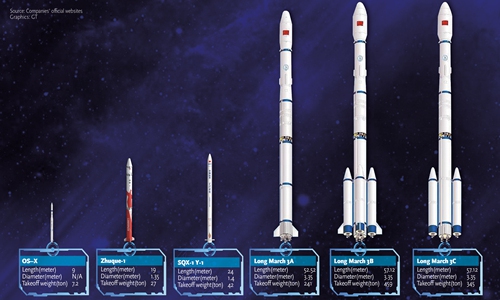Commercial space industry is soaring
By Zhang Hongpei and Li Xuanmin Source:Global Times Published: 2019/12/25 21:38:40
Private, state firms reap gains of past efforts, make technological advance

A simulated diagram of Xiaoxiang 1, a commercial research nanosatellite developed by Spacety Photo: Courtesy of Spacety
China's commercial space sector is growing rapidly and its development is reaching a climax this year with domestic players making technology breakthroughs, executives and industry analysts told the Global Times on Wednesday.
"For both players with state-owned enterprise backgrounds or private-invested, this year means harvesting the gains" of past efforts, said Huang Zhicheng, an expert in the space industry.
The overall atmosphere is very dynamic, Huang told the Global Times.
Earlier this month, two solid-fueled Kuaizhou-1A rockets were fired into orbit from the same spaceport in northern China with a gap of less than six hours. Kuaizhou-1A is a low-cost solid-fuel carrier rocket with high reliability and a short preparation period. The rocket, developed by a company under the China Aerospace Science and Industry Corp (CASIC), is mainly used to launch low-orbit microsatellites.

Cao Meng, head of marketing at Expace Technology Co, which is subordinate to state-owned CASIC, told the Global Times that the company has basically completed its mission of eight to nine launches planned at the beginning of the year, and it is scheduled to do four to five launches in the first half of next year.
In August, China's another new carrier rocket Smart Dragon-1, developed by the China Rocket Co (affiliated to the China Academy of Launch Vehicle Technology) and designed for commercial use, made its maiden flight, sending three satellites into planned orbit.
Unlike the carrier rockets of the world-known Long March family, the new Dragon series was developed in a commercial mode to meet the market demand to launch small commercial satellites, according to the Xinhua News Agency.
Start-ups' opportunities
Space is a hard place to operate, and doing business in the sector seems to be more difficult for private-sector companies, which have to make full efforts in technology research and development, talent attraction and sufficient financing to support their own survival.
The development of China's private space sector, including rockets, satellites and space-to-ground internet connections, is still in its initial phase, experts noted.
In August, China's another new carrier rocket Smart Dragon-1, developed by the China Rocket Co (affiliated to the China Academy of Launch Vehicle Technology) and designed for commercial use, made its maiden flight, sending three satellites into planned orbit.
Unlike the carrier rockets of the world-known Long March family, the new Dragon series was developed in a commercial mode to meet the market demand to launch small commercial satellites, according to the Xinhua News Agency.
Start-ups' opportunities
Space is a hard place to operate, and doing business in the sector seems to be more difficult for private-sector companies, which have to make full efforts in technology research and development, talent attraction and sufficient financing to support their own survival.
The development of China's private space sector, including rockets, satellites and space-to-ground internet connections, is still in its initial phase, experts noted.

Private rocket firm iSpace's carrier rocket successfully sent satellites into orbit in July from the Jiuquan Satellite Launch Center in Northwest China's Gansu Province, a milestone for China's commercial space industry. It was the first private-sector space firm to do so, after two earlier failures of the other two leading rocket start-ups - OneSpace and LandSpace.
Called SQX-1 Y-1, the iSpace's rocket is the largest and most powerful built by a private Chinese space company, the Beijing-based start-up said.
Yao Bowen, vice president of iSpace, told the Global Times Wednesday that this year's experience taught the company to stick to its targets in phases to achieve them step by step.
"Featuring high risks and a scrupulous R&D process, the rocket project needs long periods of hard work and patience," said Yao.
He said iSpace plans to do four to seven space launches next year, according to current orders.

Called SQX-1 Y-1, the iSpace's rocket is the largest and most powerful built by a private Chinese space company, the Beijing-based start-up said.
Yao Bowen, vice president of iSpace, told the Global Times Wednesday that this year's experience taught the company to stick to its targets in phases to achieve them step by step.
"Featuring high risks and a scrupulous R&D process, the rocket project needs long periods of hard work and patience," said Yao.
He said iSpace plans to do four to seven space launches next year, according to current orders.

"We have made profits via rocket projects since this July's successful launch and want to expand our business in this sector next year," said Yao.
Yao also noted that iSpace wants to take another giant step next year in the area of reusable rockets.
Another important component of the commercial space sector is made up by satellite companies, and they are also betting on the market next year.
Galaxy Space, a commercial aerospace company, plans to launch China's first low-Earth orbit (LEO) 5G broadband satellite in early January, CEO Xu Ming told the Global Times. The satellite has been delivered to the Jiuquan launch base, where it's waiting to be launched.
The launch is aiming to catch up with US rivals such as Oneweb and SpaceX, which have already set up LEO satellite networks.
Galaxy Space's satellite will also be the world's first LEO broadband satellite in the Q/V band, an extremely high-frequency band. "We will send more low-cost, high-performance 5G satellites into space," Xu noted.
Another satellite firm, Spacety, based in Changsha, capital of Central China's Hunan Province, has so far sent 18 satellites into orbits, seven this year alone.
To some degree, the satellite segment has taken faster steps than the rocket segment in the whole commercial space sector, said Yang Feng, CEO of Spacety.
Yang told the Global Times on Wednesday that the company has been able to cut its satellite manufacturing costs year after year.
"Commercial space is a globalized market and China is showcasing a set of 'box combinations' composed of state-owned players and private ones, to join the race in the global market," Yang noted.
Yao also noted that iSpace wants to take another giant step next year in the area of reusable rockets.
Another important component of the commercial space sector is made up by satellite companies, and they are also betting on the market next year.
Galaxy Space, a commercial aerospace company, plans to launch China's first low-Earth orbit (LEO) 5G broadband satellite in early January, CEO Xu Ming told the Global Times. The satellite has been delivered to the Jiuquan launch base, where it's waiting to be launched.
The launch is aiming to catch up with US rivals such as Oneweb and SpaceX, which have already set up LEO satellite networks.
Galaxy Space's satellite will also be the world's first LEO broadband satellite in the Q/V band, an extremely high-frequency band. "We will send more low-cost, high-performance 5G satellites into space," Xu noted.
Another satellite firm, Spacety, based in Changsha, capital of Central China's Hunan Province, has so far sent 18 satellites into orbits, seven this year alone.
To some degree, the satellite segment has taken faster steps than the rocket segment in the whole commercial space sector, said Yang Feng, CEO of Spacety.
Yang told the Global Times on Wednesday that the company has been able to cut its satellite manufacturing costs year after year.
"Commercial space is a globalized market and China is showcasing a set of 'box combinations' composed of state-owned players and private ones, to join the race in the global market," Yang noted.
RELATED ARTICLES:
Posted in: INDUSTRIES